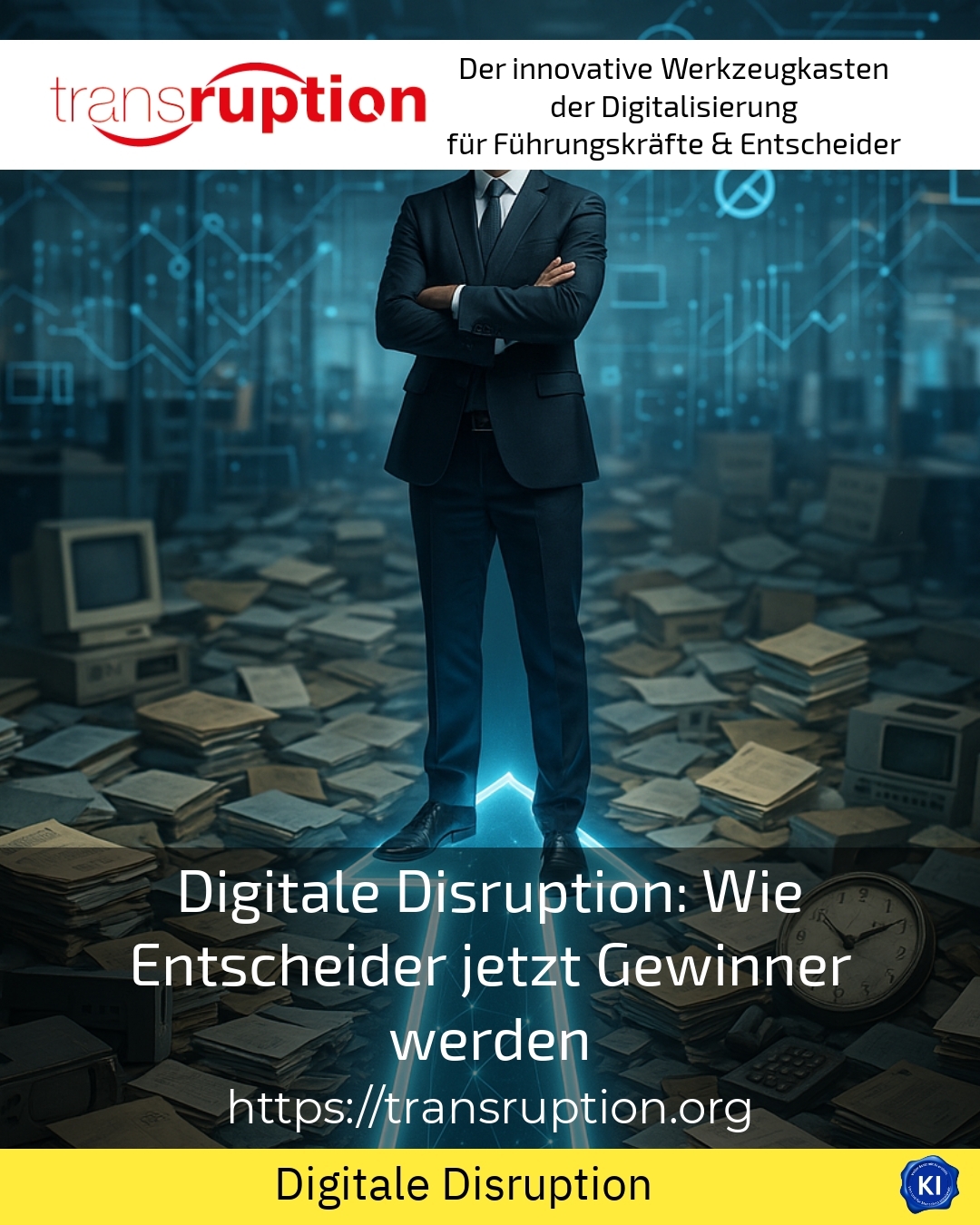Digital disruption presents many decision-makers with major challenges, but at the same time it offers enormous opportunities to emerge from the change as a winner. The rapid development of digital technologies is fundamentally changing markets and business models. Companies that understand early on how they can utilise these changes will gain a decisive competitive advantage.
Digital disruption: a change with vision
Digital disruption is the process by which new digital technologies disrupt traditional business models and redefine markets. For example, the Amazon platform has massively changed the retail sector by acting as a marketplace without operating a traditional warehouse itself. Streaming services such as Netflix are also revolutionising consumer behaviour in the media industry. These examples show how established industries are being challenged by digital innovations and why decision-makers should actively support this change in order to capitalise on opportunities.
Numerous impulses from digital disruption can also be recognised in the mobility industry. Uber, for example, has challenged the taxi industry as a platform by directly connecting drivers and customers. The increase in efficiency and convenience for users are examples of how new digital models can transform a traditional ecosystem. This creates win-win situations for everyone involved: providers benefit financially, customers enjoy attractive prices and new services.
Understanding and strategically utilising digital disruption
Decision-makers often report that a lack of clarity about how to deal with disruptive technologies is a major obstacle. Structured support for digital disruption projects can help here. The aim is not just to react to technological innovations, but to proactively develop new business models. An example from the travel industry shows how online portals such as Booking.com have put traditional travel agencies under pressure. At the same time, this digital platform enables customers to book easily with a transparent price overview - an enormous added value.
Digital innovations also play a major role in the financial sector. FinTech companies, for example, offer digital payment solutions and cryptocurrencies that are redefining the traditional banking sector. Decision-makers from banks can provide important impetus by implementing their own digital solutions or collaborating with start-ups in order to stay ahead of the game. Digital disruption therefore requires an openness to new ideas and the courage to leave familiar paths.
BEST PRACTICE at the customer (name hidden due to NDA contract) Transruption Coaching supported a financial services provider in the development of an innovative digital payment system. By combining existing resources and the latest technologies, a platform was created that enables customers to make fast and secure transactions, thereby increasing competitiveness.
How decision-makers become winners of digital disruption
Successful decision-makers approach digital disruption not as a risk, but as an opportunity. This requires a new mindset. Companies that see change as an ongoing process are better positioned.
One important step is to promote a culture of error that gives room for innovation. In the automotive industry, for example, Tesla is setting new standards with electric cars and self-driving technologies that are challenging established manufacturers. Decision-makers who support this spirit of innovation and at the same time systematically review the digital maturity of their organisation are laying the foundations for sustainable success.
Digital platforms are also a key topic. Companies such as Airbnb do not control their own properties, but are revolutionising the hotel industry by orchestrating existing resources. Decision-makers can learn from these business models by thinking less in silos and networking existing structures more closely.
BEST PRACTICE at the customer (name hidden due to NDA contract) A medium-sized retailer was supported in setting up an online platform with the help of transruptions coaching. This not only expanded sales, but also built a community that significantly strengthened customer loyalty and sales.
Practical tips for dealing with digital disruption
In order to respond successfully to digital disruption, decision-makers should integrate the following impulses into their everyday lives:
- Carry out regular market and technology analyses to identify disruptive trends at an early stage.
- Create spaces for innovation in which new ideas can be tried out without fear of making mistakes.
- Establish strategic partnerships with start-ups and technology companies to expand digital expertise.
- Actively gather customer feedback and use it as a basis for continuous product and service optimisation.
- Develop, test and quickly adapt digital business models in an agile way.
This approach supports managers in developing real competitive advantages from digitalisation and disruptive changes.
My analysis
Now more than ever, digital disruption means that decision-makers need to react actively and strategically to the changes. Change opens up numerous opportunities for companies to tap into new markets and establish innovative business models. Those who have the courage to question existing structures and open themselves up to new ideas will be particularly successful. Support through transruption coaching can provide valuable assistance with this complex challenge. Decision-makers who organise digital disruption as an integrated, continuous process position themselves successfully in the new digital economy.
Further links from the text above:
Digital disruption - definition, explanation and tips - nerdly
Digital disruption - IT professional
Disruptive business models: creating new markets - Digital Centre Chemnitz
For more information and if you have any questions, please contact Contact us or read more blog posts on the topic TRANSRUPTION here.
















